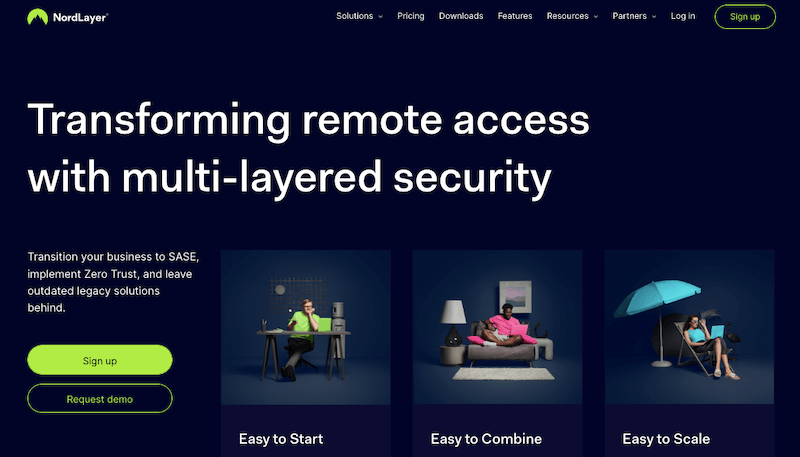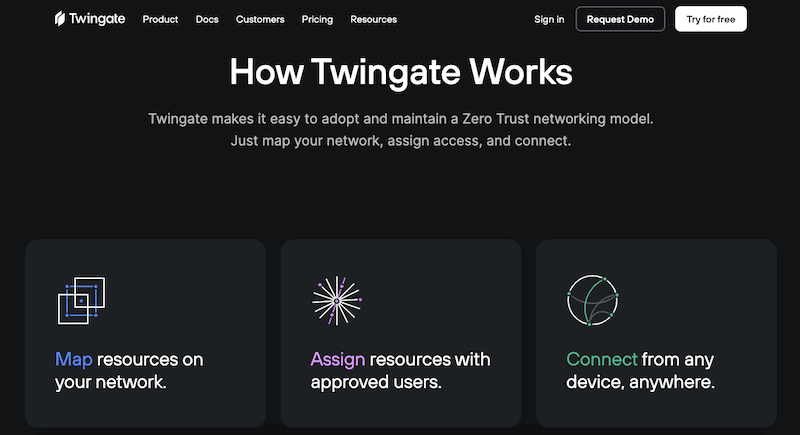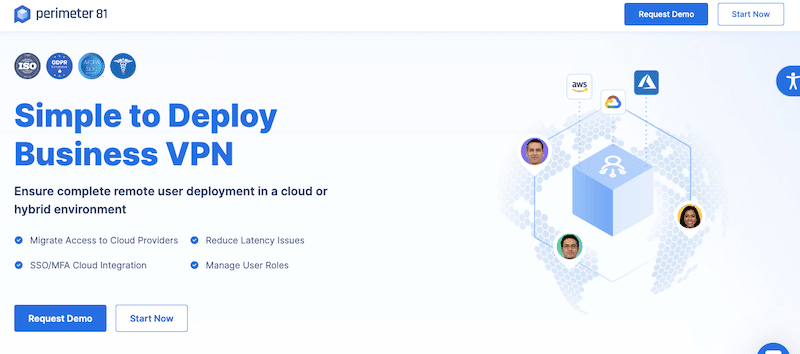Our funding comes from our readers, and we may earn a commission if you make a purchase through the links on our website.
The Best VPNs For Enterprises
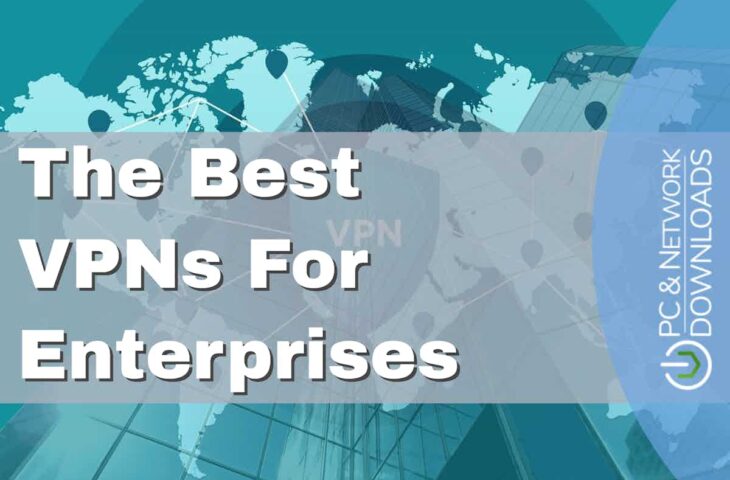
UPDATED: June 1, 2023
An enterprise-grade VPN is an essential cybersecurity tool, not only for providing a private browsing experience for employees but also for interconnecting remote offices and mobile users. An enterprise VPN should be scalable and flexible enough to accommodate a hybrid workforce and give secure remote access to all employees (regardless of location) to company resources and apps.
This article will go through the best VPNs for enterprises (along with VPN alternatives) with outstanding performance, security, scalability, pricing, and robust features. Not all the products featured here are “technically VPNs,” but they do perform a more suitable job tailored for the enterprise.
Here is our list of the best VPNs for enterprises:
- NordLayer – EDITOR'S CHOICE A robust network access solution with various types of VPNs, such as remote access VPNs, business VPNs, and cloud VPNs. Access a free demo.
- Twingate – FREE TRIAL A provider of remote access solutions based on zero-trust access controls. It is a fantastic alternative to an enterprise VPN.
- Perimeter 81 – GET DEMO A leading secure remote access software provider based on zero-trust architecture.
- Cisco AnyConnect VPN A mobility VPN client that provides secure access for the mobile and remote workforce to an internal network.
- Fortinet FortiClient VPN Client offers both SSL and IPSec VPN technology (with AES-256 and 3DES encryption) to protect all endpoint data in transit.
- GoodAccess A leading cloud VPN solution with optimal remote access security and access to a global VPN server network.
- Citrix Gateway (former NetScaler Gateway) A secure remote access on-premises solution.
- Pulse Connect Secure VPN is a zero-trust secure access-based VPN service.
- Palo Alto Networks GlobalProtect A secure remote access solution (ZTNA) for the “hybrid”— workforce.
- Zscaler Private Access A next-generation and cloud-native ZTNA service —an excellent replacement for a VPN.
Consumer VPN vs. Enterprise VPN
The core function of the enterprise VPN is the same as that of a consumer VPN: establishing a secure virtual tunnel to a remote trusted network across unsecured networks, such as the Internet. This “core function” has various byproducts: removing geographic boundaries, hiding IP addresses, and improving network security. Individual consumers, as well as enterprises, can benefit from these byproducts.
So what are the differences between them?
Individual or home-based VPN consumers are generally looking to hide their IP address or change their geo-location, so they get VPNs with limited capabilities tailored to that type of consumption. Enterprises, on the other hand, are generally looking for secure remote access to their applications and data, so enterprise VPN services offer the whole package (VPN server-client), including more features, dedicated resources, and better “tailored” customer support.
- An enterprise VPN is tailored for a business use case. It can help enterprises set up a VPN server in the network and allow authorized remote users (employees, partners, suppliers, etc., with VPN clients) access to the network (including apps or data). Another clear distinction is that enterprise VPNs allow multiple user accounts, where all accounts can be managed centrally. An enterprise VPN service also offers access and account management tools to help network admins have a clear view of all users with VPN access. They also get granular access controls for monitoring and managing all user activity and configuring allow/deny access to certain network areas.
- A consumer-grade VPN service targeted at individuals or small office home offices (SOHO) usually only allows a handful of users (commonly from 1-8) under one account. In addition, this consumer-grade VPN also provides the service through shared resources (including IP and server) for various users. Sharing resources usually entails less privacy, speed, and overall VPN performance. Another clear distinction between consumer-grade and enterprise VPNs is that consumer VPNs do not offer site-to-site connectivity.
Factors To Consider When Choosing A VPN For Enterprises
Although you could find more “cost-efficient consumer-grade VPN services” allowing multiple users per account, we recommend using an enterprise VPN service for your company as it provides the right vital business-exclusive features. Consider the following factors when choosing a VPN for your business.
- Scalability An enterprise VPN should be able to scale and accommodate an increasing number of users. If scalability is on your mind, avoid VPN-shared resources at all costs. Scalability also entails management, which should be held through a simple account and access management as networks grow.
- Hosting In many cases, choosing a cloud-based VPN service instead of a self-hosted one is better. A Cloud VPN service (through a VPN Gateway) offers more convenience when connecting to remote resources. An exception to this rule could be if your industry hosts sensitive data such as health, financial, or military. Specific compliance rules won't allow using any third-party hosting services.
- Security Always choose a VPN with a strong security portfolio regardless of your industry or business size. Strong encryption, two-factor authentication, no-logs policy, and open-source VPN protocols are some of the vital features. In addition, also consider ZTNA technologies (outside the scope of a VPN).
- Access management Choose a VPN for the enterprise that allows fine granular access controls. Having access to detailed access control levels will give you the flexibility to keep certain network areas (systems, users, apps) secured with policies and filters.
- Site-to-site If your company uses a distributed network— headquarters connecting with multiple remote or branch offices, go for a VPN that offers site-to-site connectivity. This feature installs a VPN server on the headquarters to allow various “off-site” offices to connect via unsecured or public networks (i.e., the Internet) through a VPN. This feature is a good replacement for the MPLS approach to WAN.
Why is a VPN not always an optimal solution for an enterprise? Nowadays, a VPN is not the only solution to grant secure access to remote resources. A VPN can fall short when the enterprise's workforce is hybrid (mobile, on-premise, remote). VPNs deployed in such environments may only enlarge the attack surface, as they may “virtually” put the attacker on the network. VPNs may also backhaul traffic (bring Internet-targeted traffic back to headquarters and back to the Internet), adding lots of latency and delays to third-party cloud-based apps. VPNs, in such cases, won't scale easily and will be costly and complex.
There are alternative technologies (alternatives to VPNs), such as ZTNA, remote access, secure service edge, etc., which will help solve such challenges.
The Best VPNs For Enterprises
The following are the best VPNs (and alternatives) for enterprises that offer the above-mentioned features and provide the most cost-efficient pricing.
1. NordLayer – GET DEMO
NordLayer (previously known as NordVPN Teams) is considered the business-class extension of the popular consumer-grade NordVPN service. NordLayer, however, focuses on the entire network access spectrum (SASE), including VPN, access control, and other features. When it comes to the VPN for the enterprise, NordLayer offers various solutions to suit your needs, including Remote Access VPN, Business VPN, and Cloud VPN.
Key Features:
- NordLayer uses a proprietary VPN protocol: NordLynx
- Use NordLayer’s centralized control panel.
- Access to +30 different global server locations and 1100 servers
- Site-to-site VPN with amazing scaling
- Seamless integration with AWS, Azure, Google, etc.
As with any enterprise VPN, NordLayer also offers industry-standard AES-256 encryption, along with other vital features like auto-connect, tracker blocking, kill-switch, unlimited bandwidth, and access features like SSO and 2FA. Enterprises can also leverage NordLayer’s central management dashboard, where network admins with dedicated manager accounts can create accounts, control access permissions, monitor activity, and generate detailed reports about users.
Price and demo: NordLayer is available in different subscription plans, including Basic ($7 user/month), Advanced ($9 user/month), and Custom (contact NordLayer). Prices are yearly. You can see the product in action by scheduling a demo.
2. Twingate – FREE TRIAL
Twingate is a provider of security solutions based on zero-trust access controls. They provide an outstanding enterprise-grade remote access solution for mobile workers to access corporate resources without compromising network security. Twingate is a fantastic alternative to an enterprise VPN, as it also provides secure access to internal and sensitive resources.
Key Features:
- User access provision is based on user roles and the least privilege principle
- Twingate encrypts data in transit using TLS/SSL connections
- Smart Routing— a network technology that combines NAT traversal, QUIC, private proxies, and split tunneling
- Two Factor Authenticator with industry-standard TOPT format to generate 2FA codes
Twingate employs an easy-to-deploy Zero Trust Network Access (ZTNA) solution. It allows admins to keep up a zero-trust networking model on all their access. It maps all resources in your network, assigns them to any approved users, and allows them to connect anywhere and from any device.
Price and trials: Free, Teams ($5 user/month), Business ($10 user/month), Enterprise (contact sales). To start with the free version, create an account. You can also register to Twingate to start a 14-day free trial of Teams or Business.
3. Perimeter 81 – GET FREE DEMO
Perimeter 81 uses a cloud-based platform (fully managed and hosted) but also an on-premise solution to protect users in any environment, including hybrid. Perimeter 81 provides secure remote access to office resources by restricting network access using zero-trust technology. Perimeter 81 is more than a VPN; it is rather zero-trust access, which also allows you to encrypt traffic with VPN technology such as WireGuard, IPSec, and OpenVPN. Perimeter 81’s business VPN belongs to the integrated SASE solution (along with SD-WAN, ZTNA, and other tools).
Key Features:
- VPN access to public cloud providers (AWS, GCP, and Azure)
- Cloud access with SSO and MFA
- User role management and access controls
- Site-to-site connectivity with reduced latency
- Access to the Global Edge Network to accelerate access
The solution also offers a single console for account access and management. With this, network admins can control and monitor user access, track network activity and logins, and ensure all VPN clients are up-to-date — all from a central dashboard.
Price and demo: Perimeter 81 is available through Essential ($8/user/month), Premium ($12/user/month), Premium Plus ($16/user/month), and Enterprise (contact Perimeter 81). Perimeter 81’s VPN is available in all plans except Essential. Request a demo.
4. Cisco AnyConnect
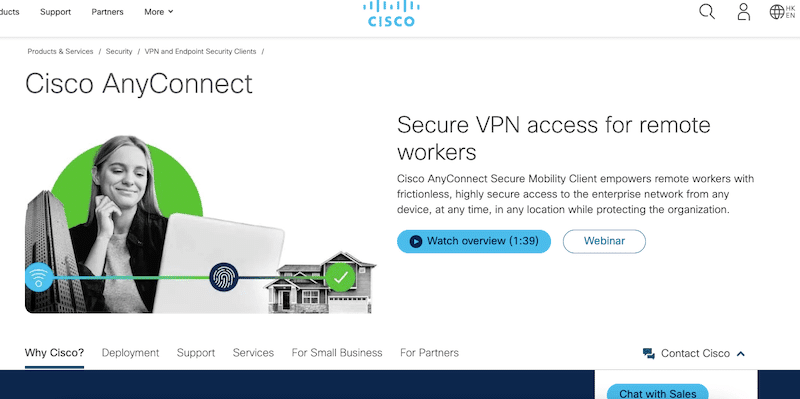
Cisco AnyConnect VPN is a mobility client that provides secure access for mobile and remote employees to an internal organization’s network and resources over the public network. Cisco AnyConnect is quite popular for its stable connection and high speed, even when multiple devices are connected simultaneously.
Key Features:
- A great solution to improve security in BYOD environments
- Built-in VPN and ISE posture modules to assess compliance
- Support for certificate deployment via integrated SCEP
- Extend protection with Umbrella Roaming when outside the VPN
- Support for Single-sign-on and MFA to improve authentication and access
Cisco AnyConnect VPN is suitable for businesses that rely on a significant remote workforce. The solution provides a central endpoint security console for allowing network admins to configure remote access controls and VPNs. This single management portal allows admins to check who is accessing the network and track the activity. When it comes to VPN technology, Cisco AnyConnect offers robust encryption mechanisms, such as AES-256 and RSA-4096, and high-end security protocols, including SSL and IKEv2, to encrypt the data in transit.
Price and trials: To find out more about Cisco AnyConnect pricing, write Cisco (Contact Sales via Email) or schedule a call with sales. You can also register with Cisco to get a 30-day evaluation of AnyConnect.
5. Fortinet’s FortiClient VPN
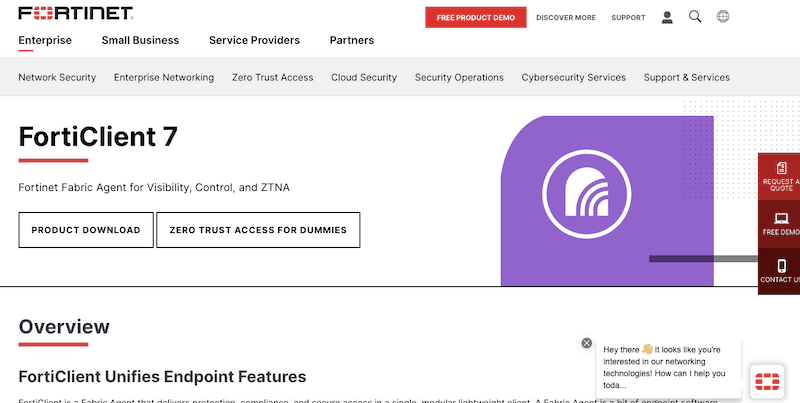
Fortinet FortiClient is an advanced endpoint security solution that offers endpoint protection, endpoint compliance, remote access control, Zero Trust Network Access (ZTNA), and a built-in VPN client. Fortinet FortiClient VPN offers both SSL and IPSec VPN-based clients (with AES-256 and 3DES encryption) to protect all endpoint data in transit.
Key Features:
- SSL VPN and IPSec encrypted tunnels
- Multi-Factor Authentication for access control
- Multi-platform support (Windows, macOS, Linux, iOS, and Android)
- Connects the endpoint (client VPN) with Security Fabric
- Vulnerability Agent to help scan and find threats and malware in endpoints
This solution also provides secure remote access via Multi-Factor Authentication (MFA) for both SSL VPN and IPSec VPN. To enable centralized management of endpoints (including VPNs), FortiClient provides the Endpoint Management Serves (EMS), where admins can monitor access details, enforce policies, and allow or deny any location or device.
Price and editions: You can download FortiClient’s VPN-only version for free (without support). But to get the full FortiClient VPN (with support), you’ll need to get in touch with the FortiClient team and look into the (full ZTNA edition). You can also request a free product demo to see the product in action.
6. GoodAccess
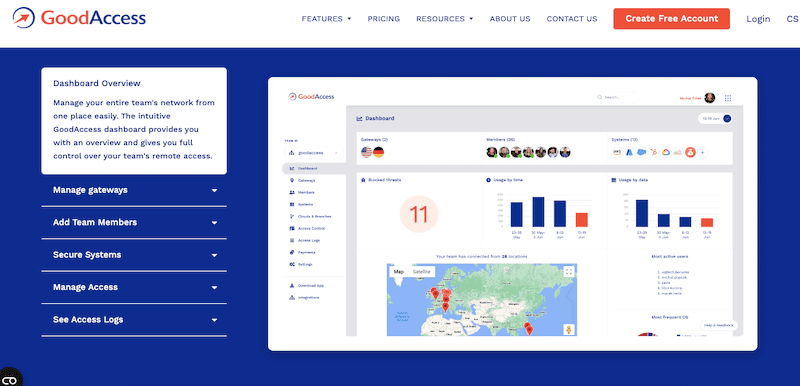
GoodAccess is a market-leading cloud VPN solution with a fantastic remote access solution. Although GoodAccess is explicitly designed for SMBs, it has fantastic scaling potential for larger businesses. GoodAccess uses IKEv2 and OpenVPN with strong encryption (AES-256 bit) to protect your network traffic from external threats. In addition, it also brings useful VPN features like public Wifi protection, branch connectivity, and port forwarding.
Key Features:
- ZTNA to improve the security of the remote connection
- Support for SSO (with Google, Azure AD, and Active Directory) and MFA
- Access to a central admin control panel
- Create allow and deny lists with access controls
- Split tunneling to route specific portions of traffic through the tunnel
- Site-to-site connectivity is included with the Advanced plan
GoodAccess offers a decent global coverage with 35 different global server locations, which is low compared to other more popular VPNs. But, the difference is that you can instantly deploy a private “virtual” gateway anywhere with a dedicated and static IP address and assign it to your team, and they will get instant fast connections. In addition, GoodAccess provides a global virtual network in the cloud (Cloud VPN) and connects to remote sites without any hardware or old WAN technologies like MPLS.
Price and trials: GoodAccess offers four different editions: Starter (Free), Essential ($4/user/month), Advanced ($8/user/month), and Premium ($10/user/month). All these plans are billed annually. To get a 14-day free trial with all premium features, create a free account right now.
7. Citrix Gateway

Citrix Gateway (former NetScaler Gateway) is a secure remote access on-prem solution. It is a cybersecurity appliance (physical or virtual) that provides a secure access point for remote employees to access apps and resources. It acts as a proxy, securing all traffic, including Citrix Workspace traffic, with the SSL/TLS encryption standard. Citrix Gateway (leveraging ZTNA technology) is a great alternative to an enterprise-level VPN.
Key Features:
- Single Sign On (SSO) and MFA support
- A single URL to access any app from any device
- Secure and easy-to-manage on-premise solution
- Encrypted and contextual access to Citrix Gateway
Citrix Gateway provides a VPN solution based on SSL, giving users full “clientless” access to internal network resources using their browser. It is usually best deployed in a DMZ and can be installed with multiple instances. It offers both solutions, either a full tunnel VPN or clientless VPN access, giving users different ways to access resources securely, including applications or data deployed on-premises or in the cloud.
How to start with Citrix Gateway?
Locate a nearby partner or contact Citrix’s customer service.
8. Pulse Connect Secure VPN
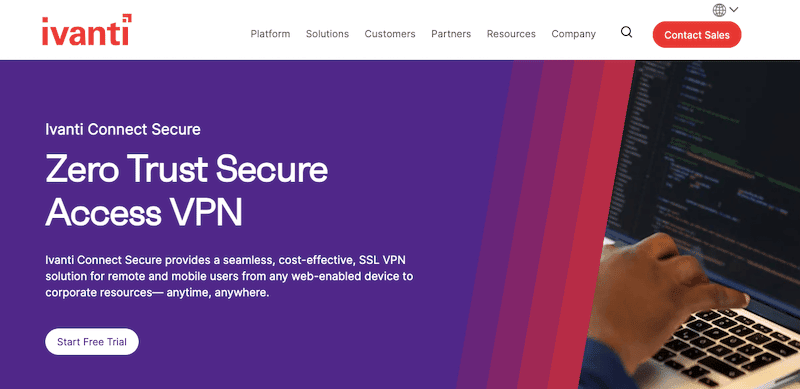
Pulse Connect Secure (now Ivanti Connect Secure) is an endpoint secure access solution for enterprise applications running on-premises or in the cloud. Pulse Secure has a fantastic range of products, including Pulse ZTNA, Pulse Policy Secure, Pulse Virtual Traffic Manager, and Pulse Connect Secure (a Zero Trust Secure Access-based VPN).
Key Features:
- Easy integration to Directory Services and Identity Services
- Integrates with EMM/MDM, SIEM, and NGFWs
- Use MFA with biometric authentication, TOPT, SAML 2.0, PKI, and IAM
- Ensure clients have easy access to resources through SSO
- Various VPN options with zero-trust connections protect data in transit
The Pulse Connect Secure platform provides all remote and mobile employees with a secure, private SSL-VPN connection to the company's network via a ZTNA solution. Employees can access remote resources anytime using a web-enabled device through the Secure Unified Client. Pulse Connect Secure also gives system admins a centralized management and visibility platform to manage policies, track users and devices, and monitor all the state and access activity.
Price and trials: Start a Free Trial of the Ivanti Connect Secure VPN. You can download the full Ivanti Connect Secure Virtual Appliance server (free trial for a limited time) and test it with the free Secure Unified Client. For pricing information, contact sales.
9. Palo Alto Networks GlobalProtect
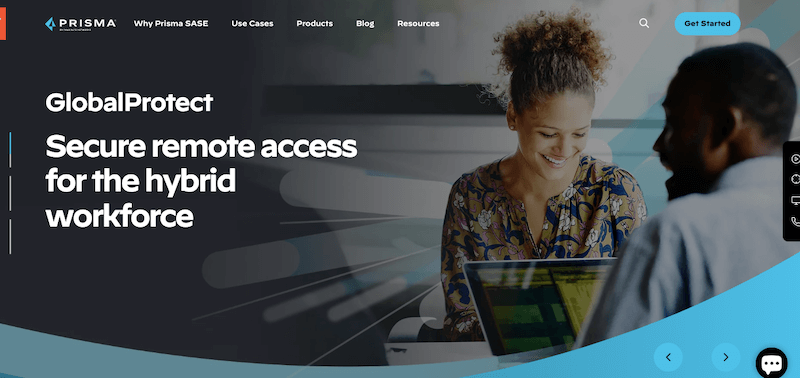
Palo Alto Networks GlobalProtect is a secure remote access solution for the “hybrid”— distributed, on-premise, or mobile workforce. It extends the security from Palo Alto Networks Prisma and Access and NextGeneration Firewalls to all these users. This platform is a full ZTNA solution (more than an enterprise-grade VPN solution). It provides not only secure ‘clientless’ access for this hybrid workforce to their corporate network but also gives admins a broad visibility into the network’s activity. GlobalProtect also allows admins to understand application usage, identify traffic’s “top talkers,” and enforce security policies.
Key Features:
- Two-factor and MFA. Plus, identity-based authentication model
- Single Sign On support – SSO for Windows, Kerberos, or macOS
- Split Tunneling technology
- Automatic/Manual Gateway selection
- Various pre-logon connection methods: always-on, on-demand, or user-initiated
When it comes to the VPN connection, GlobalProtect provides a clientless SSL or IPsec VPN for secure access to resources and sensitive data in the cloud or data center. It can also protect mobile devices with a per-app VPN on Android or iOS devices.
Price and trials: Palo Alto offers custom pricing depending on the subscription, as well as the period, number of devices, and features. Contact a sales rep to get a quote. Unfortunately, there is no free trial available, but you can schedule a live demo to see how the product (specifically SASE and SSE Prisma Access) works in action.
10. Zscaler Private Access
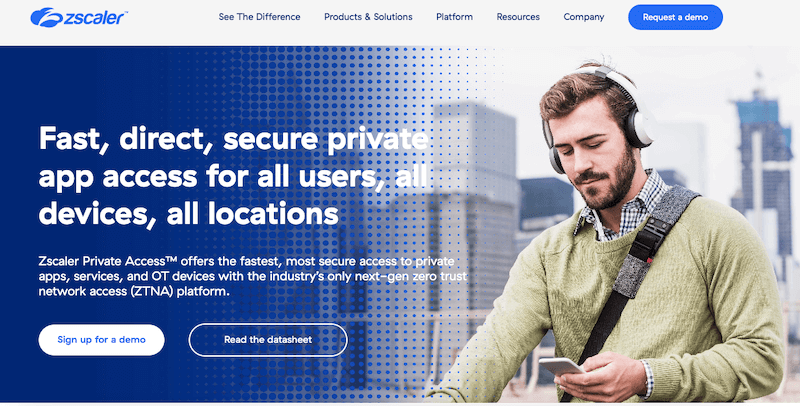
Zscaler is a leader in SSE (Secure Service Edge) and zero-trust technology for cloud security. Their popular product is their Zero Trust Exchange (ZTE)— a cloud-native platform designed to protect enterprises on their cloud migration journey. Zscaler’s ZTE technology covers protection for all its products, including Zscaler Private Access (ZPA).
Key Features:
- Fine-grain segmentation Connect every single user to private apps, services, or devices (IoT) using identity-based authentications and access controls
- Secure cloud workloads Segment every workload-to-workload cloud (AWS and Azure) communication
- Clientless remote access ZPA clients can use their browsers to access any app without needing a VPN client
- Protect apps Identify private apps in your enterprise and take action. Protect and isolate apps with inspection, prevention, and integrated cloud browser isolation
ZPA is a next-generation and cloud-native ZTNA service —an excellent replacement for a VPN in an enterprise environment. ZPA gives remote users secure access to private applications and data using the least privilege approach. This eliminates any unauthorized access or lateral movement attacks.
Price and trials: Pricing for ZPA is not listed on Zscaler’s official site, so you will need to request a Quote. Unfortunately, there are no free plans or free trials available, but you can request a Zscaler demo.

